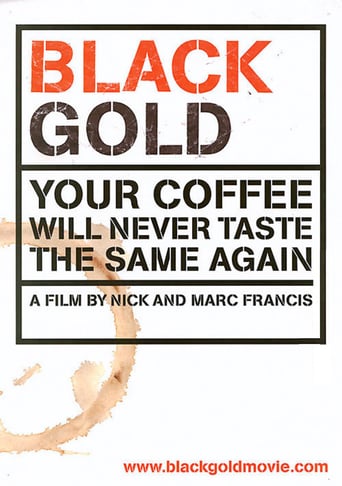MamaGravity
good back-story, and good acting
Reptileenbu
Did you people see the same film I saw?
Asad Almond
A clunky actioner with a handful of cool moments.
Abegail Noëlle
While it is a pity that the story wasn't told with more visual finesse, this is trivial compared to our real-world problems. It takes a good movie to put that into perspective.
movedout
If you didn't already know that coffee is big business, then Nick and Mark Francis's documentary should hammer that fact in. "Black Gold" could have quite easily become another impassioned and reckless rail against globalisation but you get the sense that the brothers kept their eyes on the numbers, and directed from their head and not their hearts. Therein lies the film's main problem – facts are boring. It's neither harrowing nor heartfelt. The documentary is bluntly informative of the disparate levels in income of the Ethiopian farmers and the corporations that buy the beans from them on the cheap, and it's quite competent in enlightening consumers of the buried cost of a $5 latte. And on that level, it succeeds. Somewhat admirably, they lionise the Ethiopian people, both the underpaid farmers and the ones who refuse to partake in the hopeless work. But you can also observe that the Francis brothers were hoping for something more from their primary subject, Tadesse Meskela, a high-level representative from the Oromia Coffee Farmers Co-operative Union. The directors do place him on a pedestal for most of the film, even to the extent of including an embarrassingly effusive interview from Meskela's wife as the man proudly looks on.
blasco-erin
Black Gold doesn't shout at you, vilify any single corporation or government, or make you feel guilty about really liking coffee.It does, however, invite you to see a very nuanced and sensitive view of an entire economic and social system that isn't working very well. This isn't "the anti-Starbucks movie" a la Supersize Me. This is a movie that starts the conversation about our trade system and the West's relationship with countries that feed us. Black Gold makes you want to get involved or inform yourself but doesn't map out exactly how, leaving it up to you. It isn't narrated by any off-screen voice overs and doesn't tell you exactly what to think.I was fascinated to find out how coffee is grown and how small differences in price cause huge impact on farmers' families and communities. As a Washington, DC, resident I go out for Ethiopian food more than I order pizza, so I was glad to get a glimpse of what life is like in Ethiopia and how beautiful and lush the natural scenes are.Please go see it because it's really enjoyable and thoughtful -- a refreshing new model for how to make a documentary.
rdahlby80
A insightful and disturbing look at the inner workings of the coffee industry. This should be required viewing for anyone that takes a sip of coffee after the release of the movie. A great piece of journalism that bluntly demonstrates the inequality and poverty of growers as shown through the Ethiopian farmers.I can only hope that visibility from this movie prompts something other than defensiveness from the multinationals. Do what you can to see this movie.Also interesting is the demographic breakdown of IMDb voting in the United States versus outside as well as with males 45+ - take a look.
guybennett-1
I just saw this beautifully shot, emotionally restrained documentary at The Ridge Theatre in Vancouver, B.C. It makes a quiet case for the moral necessity of some sort of CODE of global conduct in doing business. The coffee farmers in Etheopia are getting 22 CENTS a Kilo. They are STARVING. The price is manipulated in New York, and WTO seems to think this is okay. I'm fairly confident that 95% of North America coffee drinkers would be willing to pay 25 cents more a cup, to fix this situation. Damnit, this is a wonderful piece of film-making. They find the little defining moments, like a close-up shot of an Etheopian worker, cutting a bag with a naked razor blade.

